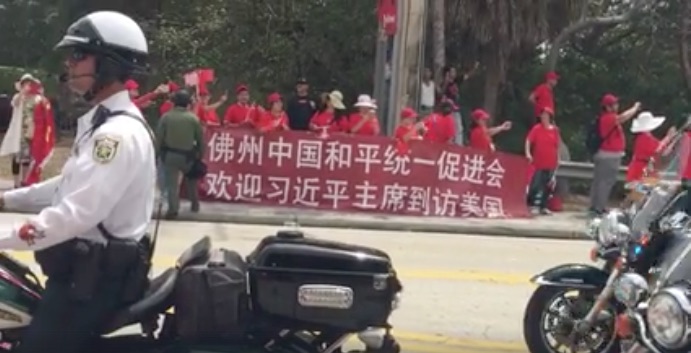Archive for Grammar
May 14, 2018 @ 5:39 am· Filed by Victor Mair under Grammar, Intonation
Rosalyn Shih has an entertaining and informative piece called "Let's Go Laaaaaaaa: And learn Cantonese particles" in LARB China Channel (5/1/18)
Some highlights:
…In Singapore, particles have migrated to English, prompting the Quora thread “Why do Singaporeans say lah at the end of every sentence?”
It seems that the more southern the Chinese-speaker, the more particles he or she might use. Citing various studies from 1924 to 1994, Language Log notes the estimates of Cantonese particles are anywhere from 30 to 206….
Read the rest of this entry »
Permalink
April 19, 2018 @ 12:19 am· Filed by Neal Goldfarb under coordination, Grammar, Intelligibility, Language on the internets, Parsing, Psycholinguistics
In "More Cohen Businesses Coming to Light," on Talking Points Memo, Josh Marshall writes:
The biggest taxi operator in New York, Evgeny “Gene” Friedman, now manages Cohen’s 30+ NYC medallions or at least did the last time we spoke to him. Friedman has been struggling for the last year to keep his taxi businesses out of bankruptcy and himself jail.
The final three words of the boldfaced clause present a weird, and dare I say unusual, case of double ellipsis. The semantic content communicated by those three words (in the context of the sentence) is richer than you'd think could be expressed by only three words, especially given that one of them is merely the conjunction and. That content can be represented as follows, with the struck-through text standing for the content that the reader must infer:
Friedman has been struggling for the last year to keep his taxi businesses out of bankruptcy and to keep himself out of jail.
There's nothing unusual about the first omission; I don't see anything wrong with the clause to keep his taxi businesses out of bankruptcy and himself out of jail. But the omission of out of strikes me as very strange, and what's even stranger is that to my ear, the clause is worse if to keep is put back:
* Friedman has been struggling for the last year to keep his taxi businesses out of bankruptcy and to keep himself jail.
Read the rest of this entry »
Permalink
December 8, 2017 @ 5:16 am· Filed by Geoffrey K. Pullum under Computational linguistics, Grammar, Information technology, Language and the media, Usage advice
In today's Dilbert strip, Dilbert is confused by why the company mission statement looks so different, and Alice diagnoses what's happened: the Elbonian virus that has been corrupting the company's computer systems has fixed all the grammar and punctuation errors it formerly contained.
That'll be the day. Right now, computational linguists with an unlimited budget (and unlimited help from Elbonian programmers) would be unable to develop a trustworthy program that could proactively fix grammar and punctuation errors in written English prose. We simply don't know enough. The "grammar checking" programs built into word processors like Microsoft Word are dire, even risible, catching only a limited list of shibboleths and being wrong about many of them. Flagging split infinitives, passives, and random colloquialisms as if they were all errors is not much help to you, especially when many sequences are flagged falsely. Following all of Word's suggestions for changes would creat gibberish. Free-standing tools like Grammarly are similarly hopeless. They merely read and note possible "errors", leaving you to make corrections. They couldn't possibly be modified into programs that would proactively correct your prose. Take the editing error in this passage, which Rodney Huddleston recently noticed in a quality newspaper, The Australian:
There has been no glimmer of light from the Palestinian Authority since the Oslo Accords were signed, just the usual intransigence that even the wider Arab world may be tiring of. Yet the West, the EU, nor the UN, have never made the PA pay a price for its intransigence.
Read the rest of this entry »
Permalink
November 15, 2017 @ 1:39 pm· Filed by Victor Mair under Errors, Grammar, Pronunciation, Prosody, Tones
When I began studying Mandarin over half a century ago, I very quickly developed a pet phrase (kǒutóuchán 口頭禪 / 口头禅): lǎoshí shuō 老實說 / 老实说 ("to tell the truth; honestly"), After I married one of the best Mandarin teachers on earth (Chang Li-ching) several years later, she corrected me when I said my favorite phrase. She told me that I made it sound like lǎoshī shuō 老師說 / 老师说 ("teacher says").
Read the rest of this entry »
Permalink
October 30, 2017 @ 10:26 am· Filed by Victor Mair under Borrowing, Diglossia and digraphia, Grammar, Morphology, Multilingualism
Jeff DeMarco writes:
From a Facebook post (timeline) by a young woman in HK:
卡拉ok ing ……😂🤣
GT deftly translates it as karaoke ing.
Read the rest of this entry »
Permalink
October 23, 2017 @ 8:52 pm· Filed by Victor Mair under Borrowing, Gender, Grammar, Morphology
[This is a guest post by Krista Ryu]
It may be true that the problem of gender inequality is more severe in East Asian countries than in European countries. However, in terms of languages, Indo-European languages actually distinguish genders while East Asian languages traditionally do not.
Read the rest of this entry »
Permalink
October 20, 2017 @ 5:46 pm· Filed by Victor Mair under Borrowing, Diglossia and digraphia, Grammar, Morphology
Adrian S. Thieret found this sign inside his brand new apartment complex in Shanghai a few days ago:

Read the rest of this entry »
Permalink
September 2, 2017 @ 10:13 am· Filed by Victor Mair under Grammar, Language and politics
Ding Xueliang, a professor of PRC history and contemporary Chinese politics at the Hong Kong University of Science and Technology, has called attention to the difference between
Máo Zédōng sīxiǎng 毛泽东思想 ("Mao Zedong thought")
and
Máo Zédōng de sīxiǎng 毛泽东的思想 ("Mao Zedong's thought")
Similarly, there is a significant difference between
Xí Jìnpíng sīxiǎng 习近平思想 ("Xi Jinping thought")
and
Xí Jìnpíng de sīxiǎng 习近平的思想 ("Xi Jinping's thought")
Read the rest of this entry »
Permalink
July 4, 2017 @ 5:17 pm· Filed by Victor Mair under Grammar, Language and politics, Translation
In this widely cited article, "China says Sino-British Joint Declaration on Hong Kong no longer has meaning", Reuters (6/30/17) quoted PRC Ministry of Foreign Affairs (MFA) spokesman, Lu Kang, as follows:
Now Hong Kong has returned to the motherland's embrace for 20 years, the Sino-British Joint Declaration, as a historical document, no longer has any practical significance, and it is not at all binding for the central government's management over Hong Kong. The UK has no sovereignty, no power to rule and no power to supervise Hong Kong after the handover.
Read the rest of this entry »
Permalink
April 29, 2017 @ 1:43 am· Filed by Victor Mair under Grammar, Language and culture
My wife had an aversion to the first person pronoun. She would do practically anything to avoid saying "I". She thought it was egotistical to make frequent, direct reference to herself, whether in speech or in writing. Among traditional Chinese, she probably was not entirely unique in that regard, but she was extreme in her first person avoidance, and it was through her that I became aware of the lengths to which someone might go to keep from saying "I".
I do not fully comprehend the psychological reasons why some people shy away from use of the first person pronoun, but my sense is that it has to do with not wanting to be assertive.
Read the rest of this entry »
Permalink
April 15, 2017 @ 2:40 pm· Filed by Victor Mair under Grammar, Language and philosophy, Misnegation
This is NOT a post about misnegation, a frequent topic at Language Log. This is a reflection on the sublimity of nonnegation, which is not quite the same as transcendental affirmation. It is a linguistic and philosophical inquiry on the absence of nothingness.
First comes the linguistics; at the end comes the philosophy.
In Mandarin, we have expressions such as the following, where the bù 不 doesn't seem to make any sense in terms of its usual signification — "not":
suānbuliūliūde 酸不溜溜的 ("sourish; quite sour")
Read the rest of this entry »
Permalink
April 8, 2017 @ 1:43 pm· Filed by Victor Mair under Grammar, Language and politics, Lexicon and lexicography, Translation
Sign greeting Xi Jinping in Florida:

(Source)
Read the rest of this entry »
Permalink
March 25, 2017 @ 10:42 am· Filed by Victor Mair under Grammar, Idioms
[This is a guest post by Brendan O'Kane, written on the evening of 3/24/17]
At a friend’s dissertation defense this morning, a certain distinguished Dutch professor emeritus, explaining the appeal of prosimetric vernacular literature to audiences in late imperial Shandong, noted that “people before about 1950 were mostly bored shitless.”
This cracked the room up, naturally, but it also seemed slightly off: in my own idiolect, I might be scared shitless, but not much else. On the other hand, something that scared the shit out of me might bore the shit out of a more jaded spectator, or cause an onlooker with a meaner sense of humor to shit themselves laughing.
Read the rest of this entry »
Permalink

